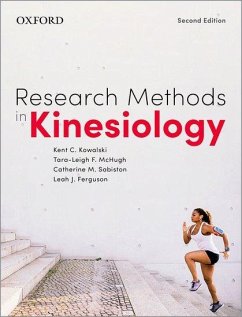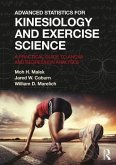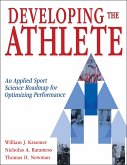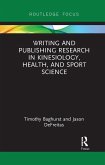Catherine M. Sabiston, Kent C. Kowalski, Leah J. Ferguson, Tara-Leigh F. McHugh
Research Methods in Kinesiology
Catherine M. Sabiston, Kent C. Kowalski, Leah J. Ferguson, Tara-Leigh F. McHugh
Research Methods in Kinesiology
- Broschiertes Buch
- Merkliste
- Auf die Merkliste
- Bewerten Bewerten
- Teilen
- Produkt teilen
- Produkterinnerung
- Produkterinnerung
Accessible and thoroughly engaging, Research Methods in Kinesiology offers students comprehensive coverage of quantitative, qualitative, and mixed methods research design from a distinctly kinesiological perspective. Written by a team of leading experts in the field and packed with numerous examples throughout of Canadian studies in sport, exercise, health, and physical education, this text gives readers the unique opportunity to learn the process as seen through the eyes of kinesiology researchers in Canada.
Andere Kunden interessierten sich auch für
![Advanced Statistics for Kinesiology and Exercise Science Advanced Statistics for Kinesiology and Exercise Science]() Moh H. MalekAdvanced Statistics for Kinesiology and Exercise Science97,99 €
Moh H. MalekAdvanced Statistics for Kinesiology and Exercise Science97,99 €![Interceptive Actions in Sport Interceptive Actions in Sport]() Keith Davids / John Kamp (eds.)Interceptive Actions in Sport94,99 €
Keith Davids / John Kamp (eds.)Interceptive Actions in Sport94,99 €![Developing the Athlete Developing the Athlete]() Nicholas A. RatamessDeveloping the Athlete98,99 €
Nicholas A. RatamessDeveloping the Athlete98,99 €![Sport and Play in a Digital World Sport and Play in a Digital World]() Sport and Play in a Digital World65,99 €
Sport and Play in a Digital World65,99 €![Writing and Publishing Research in Kinesiology, Health, and Sport Science Writing and Publishing Research in Kinesiology, Health, and Sport Science]() Timothy BaghurstWriting and Publishing Research in Kinesiology, Health, and Sport Science34,99 €
Timothy BaghurstWriting and Publishing Research in Kinesiology, Health, and Sport Science34,99 €![A Step-by-Step Guide to SPSS for Sport and Exercise Studies A Step-by-Step Guide to SPSS for Sport and Exercise Studies]() Nikos NtoumanisA Step-by-Step Guide to SPSS for Sport and Exercise Studies94,99 €
Nikos NtoumanisA Step-by-Step Guide to SPSS for Sport and Exercise Studies94,99 €![The Messiness of Leisure Research The Messiness of Leisure Research]() The Messiness of Leisure Research65,99 €
The Messiness of Leisure Research65,99 €-
-
-
Accessible and thoroughly engaging, Research Methods in Kinesiology offers students comprehensive coverage of quantitative, qualitative, and mixed methods research design from a distinctly kinesiological perspective. Written by a team of leading experts in the field and packed with numerous examples throughout of Canadian studies in sport, exercise, health, and physical education, this text gives readers the unique opportunity to learn the process as seen through the eyes of kinesiology researchers in Canada.
Hinweis: Dieser Artikel kann nur an eine deutsche Lieferadresse ausgeliefert werden.
Hinweis: Dieser Artikel kann nur an eine deutsche Lieferadresse ausgeliefert werden.
Produktdetails
- Produktdetails
- Verlag: Oxford University Press, Canada
- Seitenzahl: 336
- Erscheinungstermin: 29. November 2023
- Englisch
- Gewicht: 10g
- ISBN-13: 9780199037643
- ISBN-10: 0199037647
- Artikelnr.: 69299121
- Herstellerkennzeichnung
- Libri GmbH
- Europaallee 1
- 36244 Bad Hersfeld
- gpsr@libri.de
- Verlag: Oxford University Press, Canada
- Seitenzahl: 336
- Erscheinungstermin: 29. November 2023
- Englisch
- Gewicht: 10g
- ISBN-13: 9780199037643
- ISBN-10: 0199037647
- Artikelnr.: 69299121
- Herstellerkennzeichnung
- Libri GmbH
- Europaallee 1
- 36244 Bad Hersfeld
- gpsr@libri.de
Kent Kowalski is a professor in the College of Kinesiology at the University of Saskatchewan. His research, teaching, and applied work are primarily in the areas of sport, exercise, and health psychology. He is the principal investigator on a SSHRC research grant focused on exploring the role of self-compassion in the lives of young female athletes. He has published 45 journal articles and 14 book chapters, has reviewed over 100 submitted manuscripts for peer-reviewed journals, and is currently on the editorial board of the Journal of Sport and Exercise Psychology. He has taught introductory research methods courses to over 600 undergraduate and graduate students at the University of Saskatchewan. In addition to leading a successful research program, Kent has been a Mental Performance Consultant with the Sport Medicine and Science Council of Saskatchewan and an Assistant Coach with the University of Saskatchewan Huskie Soccer program for over 20 years. Tara-Leigh McHugh is a professor in the Faculty of Kinesiology, Sport, and Recreation at the University of Alberta, and she is currently the lead academic in the University of Alberta's Certificate in Aboriginal Sport and Recreation. She is also the principal investigator on a SSHRC research grant focused on better understanding the role of communities in supporting sport opportunities for Aboriginal youth. She has published 20 journal articles and authored 36 presentations at national and international academic conferences. Tara-Leigh has reviewed 43 manuscripts for 12 peer-reviewed journals since 2009, and she currently serves on the editorial board for Qualitative Research in Sport, Exercise and Health. She has taught research methods courses to undergraduate and graduate students at Dalhousie University, the University of Saskatchewan, and, currently, the University of Alberta. Catherine Sabiston is a professor in the Faculty of Kinesiology and Physical Education at the University of Toronto. She has taught research methods, measurement and evaluation, and statistics courses to nearly 1000 students at the University of British Columbia, McGill University, and, currently, the University of Toronto. To date, she has published in a range of psychology, health, education, and medical journals with a total of 98 publications and over 200 conference presentations. Catherine currently holds grants from all three tri-council funding agencies (SSHRC, Canadian Institutes of Health Research, and Natural Sciences and Engineering Research Council) and several other national and provincial funds. She is an associate editor for Journal of Sport & Exercise Psychology and an editorial board member for Psychology of Sport and Exercise and Sport, Exercise, and Performance Psychology. Recently, she was also an associate editor for the Encyclopedia of Sport and Exercise Psychology. Leah Ferguson is an associate professor in the College of Kinesiology at the University of Saskatchewan. Her research, which focuses primarily on young women's physical activity and psychological well-being, has been published in a number of prominent journals, including the Psychology of Sport and Exercise and Qualitative Research in Sport, Exercise and Health. She has experience with mixed methods research, as highlighted by recent publications in the Journal of Sport & Exercise Psychology and Research Quarterly for Exercise and Sport, in which she was the primary author on mixed methods research studies. Leah holds active memberships with the Canadian Society for Psychomotor Learning and Sport Psychology (SCAPPS) and the North American Society for Psychology of Sport and Physical Activity (NASPSPA), and frequently presents her research at national and international conferences. Leah is also a Mental Performance Consultant with the Sport Medicine and Science Council of Saskatchewan, where she has the opportunity to work with athletes and teams to support flourishing in sport.
* Preface and Acknowledgements
* 1. Introduction to Research in Kinesiology
* Learning Outcomes
* Introduction: Current Knowledge in Kinesiology
* Introduction to Research Methods in Kinesiology
* Components of a Research Design
* Philosophical Worldviews as Guiding Frameworks of Research
* Text Content Overview
* Summary
* Discussion Questions
* Recommended Readings
* 2. Identifying a Research Question and Study Purpose(s)
* Learning Outcomes
* The Research Topic
* The Research Problem
* The Literature Search and Review
* Purpose
* The Research Questions and Hypotheses
* Summary
* Discussion Questions
* Recommended Readings
* 3. Research Ethics
* Learning Outcomes
* Ethical Standards in Research
* Research with Indigenous Peoples
* Animal Research Ethics
* Ethical Decision-Making
* Summary
* Discussion Questions
* Recommended Readings
* 4. Quantitative Study Design
* Learning Outcomes
* Quantitative Study Design
* Threats to Experimental Validity
* Measurement in Quantitative Research
* Sampling for Quantitative Studies
* Summary
* Discussion Questions
* Recommended Readings
* 5. Data Analysis in Quantitative Studies
* Learning Outcomes
* Introduction to Data Analysis
* Descriptive Statistics
* Matching Research Questions to Statistical Analyses
* A Brief Primer on Hypothesis Testing
* Statistical Significance versus Practical Significance
* Summary
* Discussion Questions
* Recommended Readings
* 6. Evaluating the Merits of Quantitative Research Studies in
Kinesiology
* Learning Outcomes
* A Brief Primer on Validity as a Standard for Evaluating Quantitative
Research
* Application of Logical Validity
* Application of Construct Validity
* Application of Internal Validity
* Application of External Validity
* Summary
* Discussion Questions
* Recommended Readings
* 7. Qualitative Study Designs
* Learning Outcomes
* Qualitative Strategies of Inquiry
* Role of Theory in Qualitative Research
* Sampling for Qualitative Studies
* Data Generation in Qualitative Research
* Summary
* Discussion Questions
* Recommended Readings
* 8. Data Analysis in Qualitative Studies
* Learning Outcomes
* Introduction to Qualitative Data Analysis
* Qualitative Data Analysis as Immediate, Ongoing, and Spiral
* Steps in Qualitative Data Analysis
* Summary
* Discussion Questions
* Recommended Readings
* 9. Evaluating the Merits of Qualitative Research Studies in
Kinesiology
* Learning Outcomes
* A Brief Primer on Evaluating Qualitative Research
* Trustworthiness as a Starting Place for Evaluation
* Additional Considerations for Evaluating Qualitative Research
* Taking a Relativistic Approach to Evaluating Qualitative Research
* Ethics: The Bottom Line for Evaluation
* Summary
* Discussion Questions
* Recommended Readings
* 10. Mixed Methods Research
* Learning Outcomes
* Introduction to Mixed Methods Research
* Planning Mixed Methods Research
* Mixed Methods Research Designs
* Summary
* Discussion Questions
* Recommended Readings
* 11. Participatory Action Research
* Learning Outcomes
* Introduction to Participatory Action Research
* Defining Features of PAR
* Research Process
* Role of Theory in PAR
* Process for Engaging Underrepresented Populations in Research
* Inherent Challenges of PAR
* Summary
* Discussion Questions
* Recommended Readings
* 12. Knowledge Translation
* Learning Outcomes
* What Is Knowledge Translation?
* Knowledge Translation Strategies
* Traditional Knowledge Translation Approaches
* Innovative Knowledge Translation Approaches
* Selecting Knowledge Translation Strategies
* Summary
* Discussion Questions
* Recommended Readings
* Glossary
* References
* Index
* 1. Introduction to Research in Kinesiology
* Learning Outcomes
* Introduction: Current Knowledge in Kinesiology
* Introduction to Research Methods in Kinesiology
* Components of a Research Design
* Philosophical Worldviews as Guiding Frameworks of Research
* Text Content Overview
* Summary
* Discussion Questions
* Recommended Readings
* 2. Identifying a Research Question and Study Purpose(s)
* Learning Outcomes
* The Research Topic
* The Research Problem
* The Literature Search and Review
* Purpose
* The Research Questions and Hypotheses
* Summary
* Discussion Questions
* Recommended Readings
* 3. Research Ethics
* Learning Outcomes
* Ethical Standards in Research
* Research with Indigenous Peoples
* Animal Research Ethics
* Ethical Decision-Making
* Summary
* Discussion Questions
* Recommended Readings
* 4. Quantitative Study Design
* Learning Outcomes
* Quantitative Study Design
* Threats to Experimental Validity
* Measurement in Quantitative Research
* Sampling for Quantitative Studies
* Summary
* Discussion Questions
* Recommended Readings
* 5. Data Analysis in Quantitative Studies
* Learning Outcomes
* Introduction to Data Analysis
* Descriptive Statistics
* Matching Research Questions to Statistical Analyses
* A Brief Primer on Hypothesis Testing
* Statistical Significance versus Practical Significance
* Summary
* Discussion Questions
* Recommended Readings
* 6. Evaluating the Merits of Quantitative Research Studies in
Kinesiology
* Learning Outcomes
* A Brief Primer on Validity as a Standard for Evaluating Quantitative
Research
* Application of Logical Validity
* Application of Construct Validity
* Application of Internal Validity
* Application of External Validity
* Summary
* Discussion Questions
* Recommended Readings
* 7. Qualitative Study Designs
* Learning Outcomes
* Qualitative Strategies of Inquiry
* Role of Theory in Qualitative Research
* Sampling for Qualitative Studies
* Data Generation in Qualitative Research
* Summary
* Discussion Questions
* Recommended Readings
* 8. Data Analysis in Qualitative Studies
* Learning Outcomes
* Introduction to Qualitative Data Analysis
* Qualitative Data Analysis as Immediate, Ongoing, and Spiral
* Steps in Qualitative Data Analysis
* Summary
* Discussion Questions
* Recommended Readings
* 9. Evaluating the Merits of Qualitative Research Studies in
Kinesiology
* Learning Outcomes
* A Brief Primer on Evaluating Qualitative Research
* Trustworthiness as a Starting Place for Evaluation
* Additional Considerations for Evaluating Qualitative Research
* Taking a Relativistic Approach to Evaluating Qualitative Research
* Ethics: The Bottom Line for Evaluation
* Summary
* Discussion Questions
* Recommended Readings
* 10. Mixed Methods Research
* Learning Outcomes
* Introduction to Mixed Methods Research
* Planning Mixed Methods Research
* Mixed Methods Research Designs
* Summary
* Discussion Questions
* Recommended Readings
* 11. Participatory Action Research
* Learning Outcomes
* Introduction to Participatory Action Research
* Defining Features of PAR
* Research Process
* Role of Theory in PAR
* Process for Engaging Underrepresented Populations in Research
* Inherent Challenges of PAR
* Summary
* Discussion Questions
* Recommended Readings
* 12. Knowledge Translation
* Learning Outcomes
* What Is Knowledge Translation?
* Knowledge Translation Strategies
* Traditional Knowledge Translation Approaches
* Innovative Knowledge Translation Approaches
* Selecting Knowledge Translation Strategies
* Summary
* Discussion Questions
* Recommended Readings
* Glossary
* References
* Index
* Preface and Acknowledgements
* 1. Introduction to Research in Kinesiology
* Learning Outcomes
* Introduction: Current Knowledge in Kinesiology
* Introduction to Research Methods in Kinesiology
* Components of a Research Design
* Philosophical Worldviews as Guiding Frameworks of Research
* Text Content Overview
* Summary
* Discussion Questions
* Recommended Readings
* 2. Identifying a Research Question and Study Purpose(s)
* Learning Outcomes
* The Research Topic
* The Research Problem
* The Literature Search and Review
* Purpose
* The Research Questions and Hypotheses
* Summary
* Discussion Questions
* Recommended Readings
* 3. Research Ethics
* Learning Outcomes
* Ethical Standards in Research
* Research with Indigenous Peoples
* Animal Research Ethics
* Ethical Decision-Making
* Summary
* Discussion Questions
* Recommended Readings
* 4. Quantitative Study Design
* Learning Outcomes
* Quantitative Study Design
* Threats to Experimental Validity
* Measurement in Quantitative Research
* Sampling for Quantitative Studies
* Summary
* Discussion Questions
* Recommended Readings
* 5. Data Analysis in Quantitative Studies
* Learning Outcomes
* Introduction to Data Analysis
* Descriptive Statistics
* Matching Research Questions to Statistical Analyses
* A Brief Primer on Hypothesis Testing
* Statistical Significance versus Practical Significance
* Summary
* Discussion Questions
* Recommended Readings
* 6. Evaluating the Merits of Quantitative Research Studies in
Kinesiology
* Learning Outcomes
* A Brief Primer on Validity as a Standard for Evaluating Quantitative
Research
* Application of Logical Validity
* Application of Construct Validity
* Application of Internal Validity
* Application of External Validity
* Summary
* Discussion Questions
* Recommended Readings
* 7. Qualitative Study Designs
* Learning Outcomes
* Qualitative Strategies of Inquiry
* Role of Theory in Qualitative Research
* Sampling for Qualitative Studies
* Data Generation in Qualitative Research
* Summary
* Discussion Questions
* Recommended Readings
* 8. Data Analysis in Qualitative Studies
* Learning Outcomes
* Introduction to Qualitative Data Analysis
* Qualitative Data Analysis as Immediate, Ongoing, and Spiral
* Steps in Qualitative Data Analysis
* Summary
* Discussion Questions
* Recommended Readings
* 9. Evaluating the Merits of Qualitative Research Studies in
Kinesiology
* Learning Outcomes
* A Brief Primer on Evaluating Qualitative Research
* Trustworthiness as a Starting Place for Evaluation
* Additional Considerations for Evaluating Qualitative Research
* Taking a Relativistic Approach to Evaluating Qualitative Research
* Ethics: The Bottom Line for Evaluation
* Summary
* Discussion Questions
* Recommended Readings
* 10. Mixed Methods Research
* Learning Outcomes
* Introduction to Mixed Methods Research
* Planning Mixed Methods Research
* Mixed Methods Research Designs
* Summary
* Discussion Questions
* Recommended Readings
* 11. Participatory Action Research
* Learning Outcomes
* Introduction to Participatory Action Research
* Defining Features of PAR
* Research Process
* Role of Theory in PAR
* Process for Engaging Underrepresented Populations in Research
* Inherent Challenges of PAR
* Summary
* Discussion Questions
* Recommended Readings
* 12. Knowledge Translation
* Learning Outcomes
* What Is Knowledge Translation?
* Knowledge Translation Strategies
* Traditional Knowledge Translation Approaches
* Innovative Knowledge Translation Approaches
* Selecting Knowledge Translation Strategies
* Summary
* Discussion Questions
* Recommended Readings
* Glossary
* References
* Index
* 1. Introduction to Research in Kinesiology
* Learning Outcomes
* Introduction: Current Knowledge in Kinesiology
* Introduction to Research Methods in Kinesiology
* Components of a Research Design
* Philosophical Worldviews as Guiding Frameworks of Research
* Text Content Overview
* Summary
* Discussion Questions
* Recommended Readings
* 2. Identifying a Research Question and Study Purpose(s)
* Learning Outcomes
* The Research Topic
* The Research Problem
* The Literature Search and Review
* Purpose
* The Research Questions and Hypotheses
* Summary
* Discussion Questions
* Recommended Readings
* 3. Research Ethics
* Learning Outcomes
* Ethical Standards in Research
* Research with Indigenous Peoples
* Animal Research Ethics
* Ethical Decision-Making
* Summary
* Discussion Questions
* Recommended Readings
* 4. Quantitative Study Design
* Learning Outcomes
* Quantitative Study Design
* Threats to Experimental Validity
* Measurement in Quantitative Research
* Sampling for Quantitative Studies
* Summary
* Discussion Questions
* Recommended Readings
* 5. Data Analysis in Quantitative Studies
* Learning Outcomes
* Introduction to Data Analysis
* Descriptive Statistics
* Matching Research Questions to Statistical Analyses
* A Brief Primer on Hypothesis Testing
* Statistical Significance versus Practical Significance
* Summary
* Discussion Questions
* Recommended Readings
* 6. Evaluating the Merits of Quantitative Research Studies in
Kinesiology
* Learning Outcomes
* A Brief Primer on Validity as a Standard for Evaluating Quantitative
Research
* Application of Logical Validity
* Application of Construct Validity
* Application of Internal Validity
* Application of External Validity
* Summary
* Discussion Questions
* Recommended Readings
* 7. Qualitative Study Designs
* Learning Outcomes
* Qualitative Strategies of Inquiry
* Role of Theory in Qualitative Research
* Sampling for Qualitative Studies
* Data Generation in Qualitative Research
* Summary
* Discussion Questions
* Recommended Readings
* 8. Data Analysis in Qualitative Studies
* Learning Outcomes
* Introduction to Qualitative Data Analysis
* Qualitative Data Analysis as Immediate, Ongoing, and Spiral
* Steps in Qualitative Data Analysis
* Summary
* Discussion Questions
* Recommended Readings
* 9. Evaluating the Merits of Qualitative Research Studies in
Kinesiology
* Learning Outcomes
* A Brief Primer on Evaluating Qualitative Research
* Trustworthiness as a Starting Place for Evaluation
* Additional Considerations for Evaluating Qualitative Research
* Taking a Relativistic Approach to Evaluating Qualitative Research
* Ethics: The Bottom Line for Evaluation
* Summary
* Discussion Questions
* Recommended Readings
* 10. Mixed Methods Research
* Learning Outcomes
* Introduction to Mixed Methods Research
* Planning Mixed Methods Research
* Mixed Methods Research Designs
* Summary
* Discussion Questions
* Recommended Readings
* 11. Participatory Action Research
* Learning Outcomes
* Introduction to Participatory Action Research
* Defining Features of PAR
* Research Process
* Role of Theory in PAR
* Process for Engaging Underrepresented Populations in Research
* Inherent Challenges of PAR
* Summary
* Discussion Questions
* Recommended Readings
* 12. Knowledge Translation
* Learning Outcomes
* What Is Knowledge Translation?
* Knowledge Translation Strategies
* Traditional Knowledge Translation Approaches
* Innovative Knowledge Translation Approaches
* Selecting Knowledge Translation Strategies
* Summary
* Discussion Questions
* Recommended Readings
* Glossary
* References
* Index








